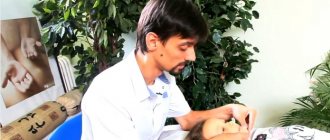Overcoming stuttering
Before moving on to specific recommendations for overcoming stuttering, it would be useful to recall some general provisions. The first thing parents should do is consult with a psychoneurologist and speech therapist, together with them, based on the child’s personality characteristics, outline and implement a program of medical and pedagogical influence.
Currently, a comprehensive method of overcoming stuttering has become widespread, in which parents play a prominent role. What is its essence?
Structurally, it consists of two interconnected parts - therapeutic and health-improving and correctional and educational. Each of them, complementing each other, pursues its own goals and objectives: therapeutic and health-improving is aimed at normalizing neuropsychic processes, at improving the nervous system; correctional and educational - to develop and consolidate correct speech skills.
To improve the child’s health, various activities are carried out, sedatives, calcium supplements, and various vitamins are prescribed. Drug therapy is combined with physiotherapy and climatotherapy, sleep, etc.
It is extremely important for parents to create a favorable, calm environment for the baby, instill cheerfulness in him, and distract him from unpleasant thoughts. The speech of adults should be friendly, leisurely, and simple. Jerking, shouting, and punishment are not allowed.
Since the body of a stuttering child is weakened in most cases, he really needs a correct and solid daily routine, a rational alternation of work and rest. A measured rhythm of life helps to normalize the functioning of the body and, in particular, higher nervous activity. In this case, sleep plays an important role. Children who stutter should sleep 10-12 hours at night and 2-3 hours during the day.
The daily routine includes time for games and walks. Moreover, it is important to choose calm games for active children, and fun, active ones for inert ones.
Parents should pay close attention to the child’s nutrition - make it varied, sufficiently high in calories, well fortified with vitamins. People who stutter are recommended to eat four meals a day with regular meal times.
Hardening procedures—rubbing, dousing, bathing—have an exceptionally beneficial effect on a child’s health. Walking, sledding and skiing are required. We should not forget about morning exercises and physical exercises, which contribute to the development of coordination of movements and improve the functioning of the cardiovascular and respiratory systems. The daily routine should also include elements of child labor: the child can bring dishes, remove spoons and pieces of bread from the table, tidy up the children's corner, and prepare items for play. The child is entrusted with caring for plants, etc.
Medical and health activities create a physiological foundation for conducting special speech classes. Corrective and educational measures are aimed at normalizing the tempo, smoothness and rhythm of speech, developing the ability to work purposefully, enhancing speech communication, as well as eliminating defects in sound pronunciation.
The program of correctional and educational activities is implemented in the process of the child’s daily activities, and is as close as possible to his needs, interests, hobbies, in a word, speech correction should take place in natural conditions. Under no circumstances should you force a child to complete certain tasks. He must do everything without much coercion.
The essence of stuttering
Stuttering is a fairly common phenomenon. However, everyday observations show that adults do not have a clear idea of stuttering, a clear understanding of the psychology of people who stutter, or knowledge of evidence-based ways of prevention and treatment.
Stuttering is not only a complex speech disorder, but also a disease of the entire body. And therefore, along with pedagogical measures, children who stutter need special restorative treatment.
Surveys of parents showed that for the most part they understand stuttering as a kind of “mechanical breakdown” of sound pronunciation and do not associate it with complex mental processes. Hence the purely formal approach to the education and training of people who stutter.
How does modern science interpret this phenomenon? Based on the teachings of I.P. Pavlov, stuttering is considered as a particular type of neurosis - logoneurosis (speech neurosis), resulting from a functional disorder of higher nervous activity.
It is known that two interconnected and interdependent processes continuously occur in the cerebral cortex - excitation and inhibition. Normally, balancing each other, they create peace and well-being for the entire body, the so-called state of comfort. But when the mutual balance of these processes is disrupted, a phenomenon arises that I. P. Pavlov figuratively called a “collision.”
The diseased focus formed as a result of such a “collision” changes the interaction between the cortex and subcortex. Having escaped the control of the cortex, subcortical formations begin to send random impulses to the cortex, including the speech production zone, causing the appearance of convulsions in various parts of the speech apparatus (larynx, pharynx, tongue, lips). As a result, some of its components fire earlier, others later. The pace and smoothness of speech movements is disrupted - the vocal cords close or open tightly, the voice suddenly disappears, words are pronounced in a whisper and prolongated (elongated) - pp-field, bbb-be-birch, which is why the thought is expressed vaguely, is not brought to the end, and becomes incomprehensible to those around you.
In this regard, the question arises: “What factors negatively affect the normal course of excitation and inhibition?”
There are several reasons. But the main one is the weakness of the nervous system, most often caused by infectious diseases (complications after measles, scarlet fever, meningitis, encephalitis), sluggish chronic pathology - rheumatism, pneumonia, etc.
Sometimes children are born with a weakened nervous system, which is the result of an unfavorable pregnancy.
We have named a group of causes of a pathogenic nature, but there is also another group - defects in education. An abnormal household environment, quarrels between parents in the presence of a child, an uneven attitude towards him (shouting, intimidation, punishment), and finally, different demands in the family hurt the child’s psyche and lead to a speech disorder.
Many other factors are known to science and practice, for example, left-handedness, imitation, hesitations in speech, impaired sound pronunciation, speech underdevelopment, etc. By the way, it is undesirable to both lag and excessively rapid development of speech, encouraging children to master complex words and sentences . It also happens that a child, imitating the sloppy speech of those around him, tries to quickly express his thoughts, gets confused, gets confused in sounds and begins to stutter.
However, the listed factors are not enough for stuttering to occur. A kind of impetus, a trigger for stuttering, are irritants such as fear, conflict situations, and difficult emotional experiences. From here it becomes clear why children more often begin to stutter after illnesses: a weakened nervous system reacts sharply to strong stimuli, to a rude shout, etc.
Stuttering in most cases is associated with fear (animal attacks, car collisions, fires, drowning, rooster crowing, punishment, emotional stress). Indeed, about 70 percent of stuttering cases are associated with mental trauma.
They may object: “Many children get scared, but not all of them stutter.” What is true is true. To be or not to stutter depends entirely, as we have noticed, on a number of incidental circumstances - the state of the nervous system at the time of mental trauma, the strength of the traumatic stimulus, etc.
Stuttering usually develops in children between two and five years of age, i.e., during the most rapid period of speech development. In the system of other mental processes, speech is the most fragile and vulnerable due to its “youth”, and therefore loads on the nervous system directly or indirectly affect speech activity. Young children lack strong inhibitory reactions. Babies are easily excited, and excitement can lead to convulsions, including convulsions of the speech apparatus - stuttering. Stuttering occurs three times more often in boys than in girls. Scientists explain this phenomenon by the fact that boys, due to their more active lifestyle, are exposed to more frequent traumatic opportunities. Rural schoolchildren exhibit stuttering less frequently than urban students. In rural areas there are fewer traumatic factors, there is a calmer and more measured rhythm of life.







